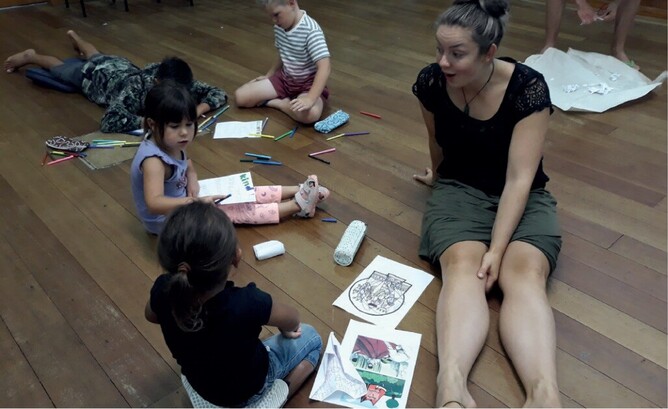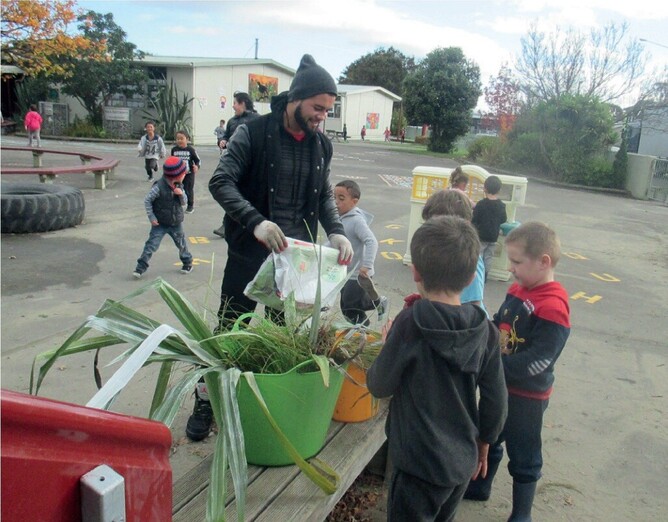Andrew and Sonja Mitchell, Church on Vogel
In 2013, Andrew and Sonja Mitchell moved churches in Palmerston North to take up a pastoral position at Church on Vogel. Their vision was to mobilise the church into a culture of reaching out to their community. Nothing unusual about that. Plenty of leaders want the same thing.
Where Andrew and Sonja depart from most pastors is the direct approach they took to building bridges with the community. The account Andrew gives is profoundly simple.
“Two blocks down the road from the church is Roslyn School. Sonja and I decided the best way to get involved with them was to have an upfront conversation with the principal.
“I simply asked if we could sponsor four kids to attend the upcoming Christian Kids Camp. I kept nothing hidden and was clear that the camp was overtly Christian. The school jumped at it!”
After consulting with teachers, the principal chose four children. Each child was from a challenging background, and three of the four were on medication. The school contacted the parents and explained the Vogel Street offer. All the families agreed to meet the Mitchells.
“If you’re going to reach out to people in the community, everything has to be relational. Face-to-face is the best way to build connections. So Sonja and I arranged to have coffee at the homes of these families.
“When you’re in front of someone, they can see who you really are; you can build trust. We said to the parents: ‘This is who we are and this is what we’re doing.’ Even though we really wanted to bring some love and joy to their kids, we made it easy for the parents to say ‘no.’”
They all said YES.
Andrew felt the camp was a brilliant experience for the children. “They were difficult kids and hard to manage. We knew they would be. But they had an absolute blast! They’re not used to such a positive, loving environment. They drank it in.”
When word of the camp’s success got back to the school, the Mitchells felt the need to have another chat with the principal.
This time, they came with a door-opening question:
“We simply asked her, ‘What can our church do to help your school?’ We let the school dictate the terms of our relationship with them.”
The principal felt there was a lack of parental involvement with many of the children. That showed in a lack of reading time and one-to-one talking with an adult. “We offered to put together a reading team that would come in and read books with whatever kids were given to us. The team was initially Sonja, myself, our daughter (doing the 1st year Pathways internship), and a couple of older women from our church.
“It went so well. When we went in, we’d each take a child for 15 minutes or so and read. We’d also encourage the kids to read to us. Then we’d talk. It’s so important for young people to have adult conversation.”
That team of five or six people now numbers 15 plus and together they cover junior to lower-middle school. The first year we did this we had only one Pathways intern. This year we have ten. Three of the interns are also on board to help tutor year 7 and 8 maths.
When it comes to Vogel Street’s connection with their community, two things are clear. First, the Mitchells are leading by example; they’ve been committed to building community connections from the time they arrived. But how have they gotten the church involved? How have they ensured that it’s not merely pastor-driven?
Andrew explains. “As a pastor, you have to know from the outset that this must be a church thing. Sonja and I could make an initial splash, but it has to go beyond that; the whole church needs to be involved.
“When people arrive at Church on Vogel it is our job to sell the vision of this community involvement. When new people arrive we listen to their story. Then we ask what they’re passionate about and get a feel for how they can contribute.
“Sometimes it means seeing where they could fit in to what we’re already doing. At other times, it means joining them up with other likeminded people and supporting a new initiative they are passionate about and gifted for.
“For example, we had four young couples arrive at Church on Vogel during a six-month period. There was a common thread with these four ladies: they all wanted to connect with younger girls. One of them had already been involved in the past with Girls’ Rally. She was keen to get something going, so we connected her with the other three ladies.
“Within a short period, these four gifted young woman had organised a Girls’ Rally which we were able to promote in the school. It started with 12 girls and has grown to 22 girls in only 18 months. Many of these girls are from the local community with no Christian backround.
“As pastors our job is to support this ministry wherever they need help. They form just one part of the big vision but each of these parts is essential to the whole. Our job is to encourage and resource them. We’re not doing the work. We’re helping people join the dots.”
At times, that means Andrew’s and Sonja’s involvement is heavy at the start. Even if that’s the case, Andrew’s intention is always to pull back and leave the people to it.
“Recently , Sonja and I took over the leadership of the youth group to help infuse the community vision. This age group is a key part of the overall strategy to connect church and community. I simply want to light a fire. We are working primarily with the young adult leaders. They need to carry the vision for the youth group. We feel that if they can catch the vision, they will be the ones to sell it to the youth.
“It’s starting to work. Our youth leaders are becoming intentional at picking up and bringing community kids to the youth group and to church on Sunday mornings.”
Everything’s connected; the youth group, Sunday mornings, the Girls’ Rally, playgroup, the work in the school. It all feeds the vision.
For many church leaders wanting to connect with their community, the hardest part is knowing where to start. One key thing Andrew did was join a Roslyn-focused community group. That immediately put him in touchwith the local librarian, Police, city councillors and others wanting to impact the community.
“When you’re in these community groups, you get a feel for the opportunities. You hear things. From the librarian, we learned about an 8-year-old boy who was causing trouble in the library. It was becoming a big issue; even police resources were being taken up. When we offered our church’s help, the librarian said ‘That would be great.’
“We asked the librarian to speak to the mother of the troubled boy. If she was happy for us to make contact, get her to give her details. The mother did. We made a phone call and organised to have coffee with her.
“We started with very small steps: ‘What if we get a few of our young adults to meet with the boy at your home, after school?’ After confidence was established, we then got permission for these young adults to take the boy down to the park for some fun. Then the siblings opted in. Then neighbourhood kids joined in!”
In spite of the success that Church on Vogel have found, it begs the question: How do you help community people enter God’s Kingdom? How do you transition beyond simply being for community people?
“Genuine love is the key. If people know they are genuinely cared for and loved, the God conversations happen. But a lot of work has to be done inside the church. Believers have to see how big God is, and how amazing the Gospel is. A lot of churches have lost their passion for what Christ has done. Without a genuine love for God and gratitude for what Christ has done, you can’t expect to reach your community.
“I’m not a big programme person. We do them, but the heart of community involvement has to be relational. It’s about doing life with people.
“At Church on Vogel, we’ve got a long way to go, but we are underway. There is so much to do that sometimes it can be quite overwhelming. Sometimes this is what stops people from starting. It seems too big. I say just start.
“But it has to be undergirded by prayer. The importance of prayer is a growing reality for us. Psalm 127:1 echoes in my heart all the time: ‘Unless the Lord builds the house those who build it labour in vain’.”
For churches wanting to grow God’s Kingdom in their community, there is an inevitable cost. “The cost of getting into the community is high, individually and collectively. You can’t pursue the secular dream of comfort and advancement AND reach the community. Something has to give because loving others takes time and resources.
“In the end, it comes down to deciding what really matters in the long run, and by ‘long-run’, I mean in eternity. Is my career that important? Or my house, or car? Is Christ important to me? If he is, then I need to live for him which means laying myself down in some way.”
Maybe for someone in the community.




